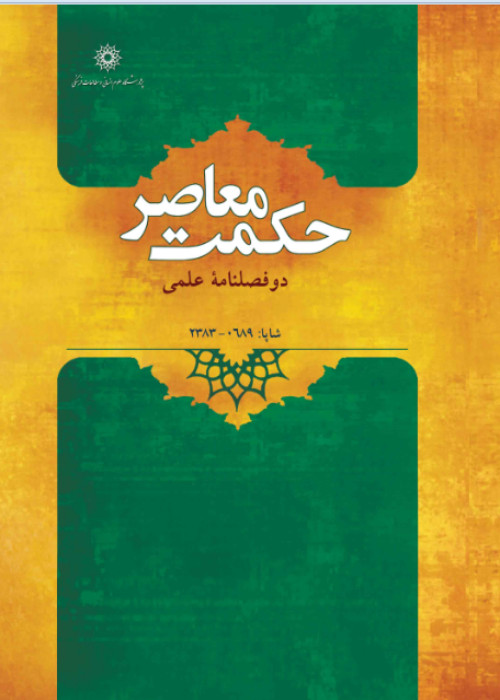Evaluation of Mirza Javad Tehrani's critiques on the Mulla Sadra's fundamental reality of existence, relying on the role of fundamental reality of existence or quiddity in the exposition of the argument of monotheism
Mirza Javad Tehrani is one of the followers of the school of Tafkik and had been strongly influenced by the thoughts of Mirza Mehdi Isfahani and Sheikh Hadi Tehrani. According to school of Tafkik, the use of rational and philosophical methods has no place in proving or explaining religious teachings. Also, one of the reasons, given by the deniers of the Sadra's philosophy is that this philosophy takes contradictory approach, and therefore they accuse the transcendent philosophy of methodological eclecticism. But Tehrani by proving the fundamental reality of quiddity and using it for the issue of monotheism, has confirmed the use of philosophical and rational discussions in the religious teachings. Tehrani by proposing eight critiques, he has criticized the principles and arguments of the fundamental reality of existence, and consequently, he considers the issue of essential monotheism to be provable only by the principles of the fundamental reality of quiddity. As for the background of the present research, the only article that has been published on this subject is "Critique of the arguments of the fundamental reality of existence in the thought of Mirza Javad Tehrani" by Hossein Soheili (Soheili and others، 1398) in the journal of Hikmat Muaser. The present research is structurally, contently and basically, from four aspects, different from this research.
In this article the authors, firstly, relying on the descriptive method and analysis of the content, have studied and evaluated eight Tehrani’s critiques on the fundamental reality of existence. Consequently, it is specified that the origin of Tehrani's attitude to explaining the provable characteristic of the Essence of the Necessary Being, in order to support the principles of the fundamental reality of quiddity, is that he did not distinguish between acceptance of requirement and acceptance of causality regarding the Essence of the Necessary Being. On the other hand, it has been cleared that, relying on the Tehrani’s view -criticizing the fundamental reality of existence and strengthening the fundamental reality of quiddity- it is not possible to give a convincing answer to Ibn Kamuna's doubt and the arguments of the monotheism of Essence, attributes and actions envisage problem. But relying on the Sadra's fundamental reality of existence, although God is not a special being of any quiddity, to require His possibility, the supreme Divine Existence possesses all perfect entities. Accordingly, firstly, the existential attributes of creatures are attributed to God in the status of the act, not in the status of the Essence. Secondly, they are attributed to God in that they are existences. Therefore, it can be acknowledged that although creatures have perfections, there is no perfection other than the perfection of God. According to this interpretation, philosophical purification will not be in conflict with the appearance of verses and hadiths that limit existential attributes as well as activity and influence in God alone or attributed the actions of the creature to God.According to Tehrani, the adherents of the fundamental reality of existence believe that the truth of external objects is existence and the truth of existence is not something like other objects, so it cannot be perceived by the five senses, but its perception is possible with intuition. According to the authors' research, Tehrani, since he could not perceive the truth of existence with empirical knowledge, inevitably considered what he perceives with his five senses as truth, and finally came to believe that what exists externally is quiddity.
These consequences are resulted from this article: 1- Tehrani’s criticisms on the fundamental reality of existence are not correct. In some positions, he quoted the words of the predecessors of the adherents of the fundamental reality of quiddity, and in other cases, he did not accept the principles of the adherents of the fundamental reality of quiddity. There are two central points in most of Tehran's criticisms: Firstly, he did not have a correct idea of how the object and the subject correspond to each other, because he considered the concrete to be a container-like reality in which external beings have taken place, while the subject and the subjective are the same thing, as well as object and objective are the same thing. Secondly, in most cases, he has meant what the adherents of the fundamental reality of existence mean, but in order to escape from this thesis, he has adhered to the fundamental reality of quiddity. 2- Considering the difference between requirement and causality, which is based on the fundamental reality of existence, the Essence of the Necessary Being can be considered as possessor of requirement, without any causality, because considering the issue of causality, the Essence of the Necessary Being will have caused and otherness of existence and quiddity in the contingents indicates the essential dependence of the contingent on the cause, but the sameness of existence and quiddity in the Necessary Being indicates the non-dependence of the Essence of Necessary Being on the cause, since His Essence is His Existence. But according to the fundamental reality of quiddity, relying on the unification of requirement and causality, in the Essence of the Necessary Being, the main problem is that the Essence of the Necessary Being can no longer be considered the Necessary Being of all aspects.
- حق عضویت دریافتی صرف حمایت از نشریات عضو و نگهداری، تکمیل و توسعه مگیران میشود.
- پرداخت حق اشتراک و دانلود مقالات اجازه بازنشر آن در سایر رسانههای چاپی و دیجیتال را به کاربر نمیدهد.




